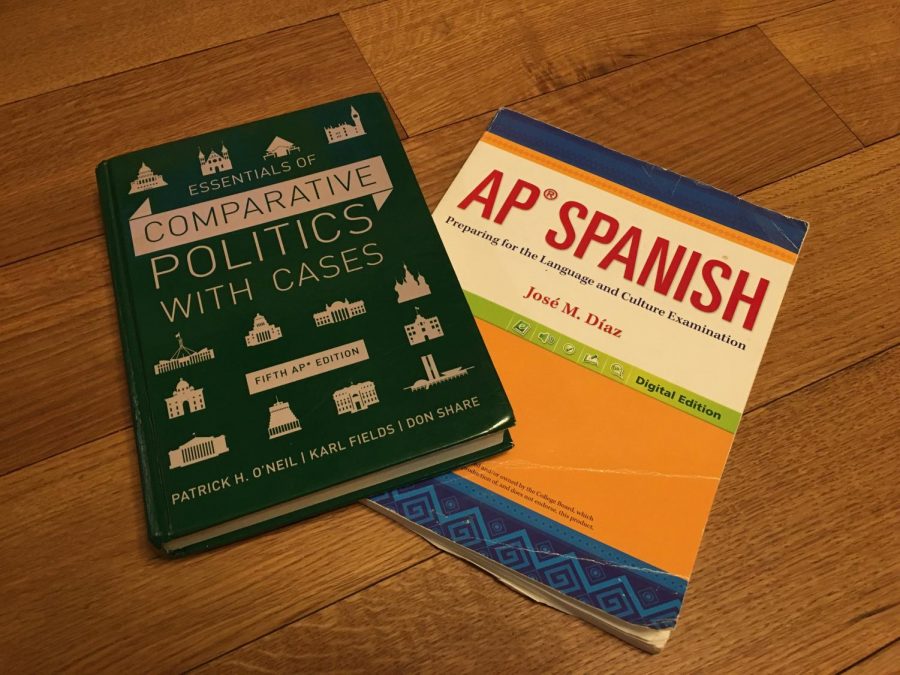Need Help Choosing Courses? We’ve Got You Covered.
January 20, 2020
Asking current teachers of an AP course what their expectations are of their students can be helpful for understanding the kind of rigor that a class will have. However, the opinions of current and past students can help in making decisions between what can and can not fit into one’s schedule or what kind of course is actually right for them. The students quoted below have varying course loads and extracurriculars.
*Hours per week reference hours spent outside of class.
**All students are left unquoted because many are current students of the course.
AP 2D Design and Photo
1hr/week
“Design and photo is mainly focused on photography and developing your portfolio with a concentration of your choice (ex. food, shadows, sports.)”
AP Computer Science
No “homework,” just need to practice independently.
“The most important thing in this class is practicing coding. It doesn’t matter how well you understand the concepts, what really matters is how much you practice coding and learning a new language of code.”
“Something that will help a student taking this class is to take advantage of the resources you have. Meeting with the teacher and using information/videos online will make a difference in your success. It is a difficult course but not impossible.”
AP Economics
4hrs/week
“Weeks before each test, the teacher assigns a number of pages or activities that must be completed from the textbook. On the day of the test, students submit this work to be graded. For some people this works perfectly because it allows them to set their own schedule, but if students procrastinate, the result is massive amounts of stress and limited sleep the day before the exam.”
“It is mainly conceptual and analytical work, but there was more math involved as the year progressed.”
“Overall Economics is a great course for foundational principles of economics and generally learning how the world functions, but students who want to do well should be prepared to self regulate and work hard inside the classroom.”
AP Language and Composition
5hrs/week
“Somebody who values divergent thinking and original thought. People who aren’t afraid to take intellectual risks.”
AP Literature and Composition
Upwards of 8hrs/week, often less
“If you love English, you will love AP Literature. If you don’t love English, or you don’t want to take a very challenging course your Senior year, then do not take AP Literature. I’ve taken many AP classes at our school, and this class has been, by far, the most challenging, especially due to hours spent outside of class. Many students are taking three AP classes alongside AP Literature, but all of them find this to be difficult. I would recommend treating AP Literature as two AP classes workwise when deciding what you have room for in your schedule.”
AP Calculus BC
Depends, if you do the homework, then you will spend time outside of class. If there is a test, some people will study and some people won’t.
“Calculus BC is a fast-paced class. It will be difficult for some students, while significantly easier for others. Personally, I am doing about average in the class. I study a lot before tests by going through old homework and review packets, but I know students that don’t study and do well, or study like me and perform poorly. Ms. Smith is an amazing teacher, and is completely willing to spend time with students who need it.”
AP Biology
5hrs/week
“The course will be very different depending on which teacher you have.”
“The class is very textbook heavy. A lot of students won’t read the textbook, but it definitely helped me reinforce the material outside of class. It’s definitely not the hardest class, but if you aren’t a strong reader or not willing to study, you probably won’t do well. A lot of it is retaining terms, rather than a class like Physics or Chemistry, which can be a lot more application based.”
AP Chemistry
4-6hrs/week
“The hours per week would average between 5-10, depending on the date of the test and the difficulty of the topic.”
“Chemistry I thought was pretty easy with a foundation in honors chemistry. Ms. Golrick is the best teacher in the entire school. It’s like a lab every couple weeks and studying, textbook homework, but it’s all optional, so I didn’t really do any of it and ended up okay but I don’t think
that’s the case for others. If underclassmen are ready to work then yea why not.”
“AP Chemistry is a difficult course that requires a lot of time and effort to understand both the concepts and applications. Ms. Golrick is always available after school, and students who need help will have no trouble getting it. The homework is necessary to understand the new information, and it helps for the tests. By the test in May, Ms. Golrick makes sure everyone is prepared.”
AP Environmental Sciences
1hr/week, unless there is a project, then it’s more like 6hrs/week
“APES is a blend of biology, chemistry, and economic principles that helps you understand environmental problems, like ocean acidification, the rules of nature, like wind patterns, and the rules of environmental science, like the biodiversity index.”
“I have really enjoyed APES, and it’s a great course if you’re passionate about the environment.”
It would be a mistake to take APES for an easy class, as many people who do end up earning low grades.”
AP Physics I
2-4hrs/week
“Just as in most high level courses, the amount of work students do in the days leading up to the test is the highest. On these days, preparation usually takes anywhere from two to four hours to review the concepts and materials. However, homework on a day to day basis is much different. Since Physics meets everyday, a fair amount of work is done at the end of class with any free time, which gives students the opportunity to ask the teacher questions. As a result, homework doesn’t take more than an hour most nights. However, students should keep in mind that homework is assigned everyday because the class meets everyday either for a mini or a full block. The hardest part of AP Physics is not the homework rigor or the initial concepts. It is learning how to apply those concepts to scenarios in AP level questions where the solution is not obvious. Even with practice and completing all of the assignments, this can be difficult because each test presents a new type of question. Often students will have to manipulate formulas in unique ways, and the math can be difficult because it requires quick thinking. However, if students are willing to complete the foundation, basic problems on schedule and approach their teacher with questions regularly, then this challenge can be met.”
AP Physics II
3-5hrs/week, if there is a test
Students that take this class should have “a really good grasp on Physics I material and feel both comfortable and interested in further applying and learning more about it.”
“Students should also feel comfortable being very independent and not totally reliant on the teacher because, while Dr. S is great and always happy to help when he’s needed, I think he expects us to understand things quickly and be ready to do them on our own.”
“Our class has 11 people, and I can’t imagine that class has ever or will ever be much larger.
Because of that, students should feel comfortable in a smaller class, which means more participation. That’s honestly one of my favorite parts about it because we’ve all become really close too.”
AP US Government and Politics
4-5hrs/week
“AP Government is a good course to take for someone who is interested in taking a high level course and wants to learn about the US government. In AP Gov. students will spend most of their homework on Khan Academy, learning principles and major events. Every few weeks, students will have to prepare simulations, which require more work because research needs to be done and group coordination is necessary.”
AP Comparative Government and Politics
1-2hrs/week
“I love the class.”
AP Psychology
6hrs/week, often more
“AP Psychology is very reading intensive. To do well in the class, you have to read all of the module notes, and there are a lot of them. There are also a lot of projects throughout the year. It is definitely time consuming. If you did well learning-wise in Biology, Psychology is taught and learned similarly, but with a lot more notes.”
“Far more hours spent per week for a class out of any class that I’ve taken.”
AP US History
3-4hrs/week
“Most of the work would be research on my own or textbook reading.”
“A student that should take APUSH is someone who really cares about American politics and history. Someone who is willing to work hard.”
AP American Studies
6hrs/week
“American Studies is an interdisciplinary course blending English and History. While reading a book, the class will typically be learning about the point in history that the book takes place in. It’s an amazing class, no matter what set of teachers you get.”
AP Spanish
4hrs/week
“There are tests very often, like sometimes three classes in a row there’s a different test. Homework every night for the most part and you learn Spanish and more specific things.”



